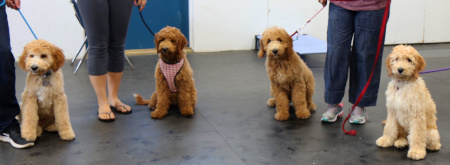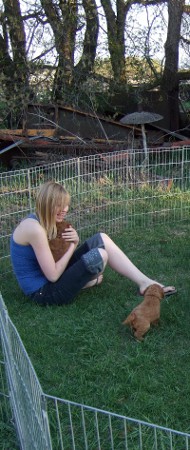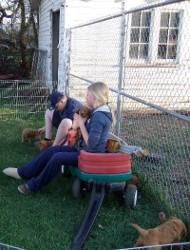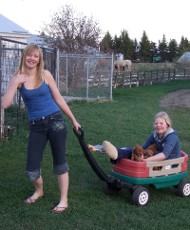
How We Raise Hearty K9s pups in their first 8 weeks of life
We are Hearty K9s believe that dogs are a true gift to humankind. We are committed to actively and purposely socializing each pup to become all that they can be to transform lives and mend hearts.
Pups in the same litter can be very different from each other. We're mindful of their needs and honour their differing paces of growth and development.
Our Puppy Curriculum: (a brief daily outline)
Days 1-2
Birthing and thriving
Once the pups are safely born I make regular visual checks to ensure they're thriving well. During the first 2 days I handle the pups very little.
Sometimes the mamas are glad to show off their pups and are happy for you to see each one in the first couple of days, but many mamas just want to care for their pups, take some rest and prefer not be disturbed. I really believe God gave the dogs a natural instinct to care for their young and I like to let them do what comes naturally.
I want to cause as little disruption as possible, especially during the first 2 days, as their nervous systems are fragile and doing too much when they're not ready may be detrimental down the road.
Days 3-16
Early development
Early Neurological Stimulation (ENS) ~ developed by Dr. Battaglia
We perform this program daily on all our pups.
Each of the 5 exercises last 3-5 seconds, done once a day.
- Tactical Stimulation. Using a Q-tip, stimulate pup between toes on any foot, while holding the pup in the other hand.
- Head held erect. Using both hands, the pup is held in an upward position so its head is directly above its tail.
- Head pointed down. Holding the pup firmly in both hands, the head is reversed and is pointed to the ground.
- Supine position. Hold the pup so that its back is resting in the palm of both hands with it's muzzle facing the ceiling.
- Thermal Stimulation. Using a damp towel that has been cooled in the fridge for at least 5 minutes, place pup on towel with feet down. Do not restrain it from moving.
- improved cardio vascular performance (heart rate)
- stronger heart beats
- stronger adrenal glands
- more tolerance to stress
- greater resistance to disease
If a puppy is highly resisting ENS we do not force them and we allow them days off when needed. Not all pups are equal and we respect their needs.
Early Scent Introduction (ESI) ~ developed by Dr. Gayle Watkins PhD
For each day in this period we introduce a pup to a different scent for 5 seconds. If they like the scent, we'll allow them to sniff about 30 seconds. We choose different scents, like bark or soil, essential oils, different spices, peanut butter and cat hair.
We've chosen to add this conditioning to our already successful puppy program as it's known to make a difference in developing a dog's confidence and overall attitude. My passion is to help develop service dogs who can be diabetic alert dogs, or used in various other means to assist people in daily living. This training could also translate to locating a child who has wandered off, or even to help in finding your keys!
ESI has been known to help dogs succeed in hunt and field trials, nose work, search and rescue, obedience, tracking, and more, which can improve confidence and stability in pets and service dogs. Dogs who are taught and engage in scenting have a more optimistic attitude toward life, and with that, fewer behavioural problems.
Days 17-27
Building trust
All activity with our pups is gentle and non-abrasive to the tender senses of the puppy at this age.The goal is to build trust and they can be curious and engage as they please. During this time we expose them to different toys and items in their whelping box.
The pups are handled very softly, from mouth to tail. We speak into their little faces to acquaint them to human breath (good and bad, lol). We hold them close to our hearts, and by our faces, and settle in to the warmth of building a connection based on trust and respect (which is one of my favourite parts of this job).
We begin placing puppies outside of the whelping box and assisting them to climb back in. This starts the process of them learning to toilet outside of where they sleep.
Days 28-34
Opening up their world
During this time, pups in most litters have started to exit the whelping box to bathroom on their own on woodchips in their nursery room.
Softened food is introduced (usually between days 24 to 31). Here we begin to teach them to come when called.
We take the pups to their first new location, which is our K9 living room. This is a big day for them and opens up their world. Most socializing begins here as we slowly and purposefully introduce them to different objects, toys, obstacles, blocks, different flooring textures, etc.
We're careful not to over stimulate but provide a safe place where they learn that life is fun. Each litter is different and we adjust the curriculum accordingly.
Days 35-41
Creating challenges
We start increasing the pups' exposure to new things that may startle them and we encourage them to work through the startle. We want the pups to believe the world is safe and they can work through new things that seem scary at first.
We introduce them to crates at this stage, which is a very slow and intentional process.
Days 42-56
Honing and matching temperaments
At this stage our pups' individual temperaments emerge. This is when I start taking more note on their behaviours and will also increase the videos I post on Instagram for the folks who are choosing from the litter.
We encourage pups to problem solve through new situations and to work through new obstacles which helps them grow in confidence.
We work on desensitizing pups, so they can learn to work through things that once caused them concern. Each pup is different and some need to learn to contain their exuberance while others need to learn to come out of their shell -- and just about everything in-between.
We continue crate exposure. Although pups are not guaranteed to be crate trained when they leave us, the initial work has been done.
Leash work is usually started at day 49, using pressure and release techniques.
During this time (anywhere from day 49 to 56) we do a Puppy Evaluation/Temperament test. In this test we learn more about the puppy which helps us to better match up pups with their owners. A video is taken of the evaluation of each pup and is sent to the people who are receiving a pup from a litter before its choosing time.
Our inspiration, the New Skete Methods
"The Art of Raising a Puppy" by the Monks of New Skete is a wonderfully practical guide for raising a companion dog. We have found a huge difference in our pups just using their methods alone.
We find that when our pups are exposed to mildly stressful exercises at an early age they usually develop into dogs with higher problem solving abilities and are more adaptable to emotionally challenging experiences later in life.
Our nursery set up has been inspired by the New Skete methods and we find that our pups house train fairly easily.
Fundamental to our approach, the Badass Breeder
I've recently discovered Jeanette Forrey and her Badass Breeder program. Jeanette used to train service dogs and now she breeds and raises pups to help set them up to be the most successful they can be, and so she produces good prospects for services dogs in every litter.
Jeanette has put words into much of what I've already innately done, and she does even more. Raising pups to change lives and heal hearts is Jeanette's motto and it has always been my motivation in my puppy program. I'm thrilled to integrate Jeanette's techniques into our already successful puppy program.
Even though we do all these wonderful things to make your pup easier to train, he/she has only just begun. It is your responsibility to continue consistent, constructive training, socialization and enrichment which can mould your pup into an exceptional life-long companion. This takes time, patience, research, and diligence.




